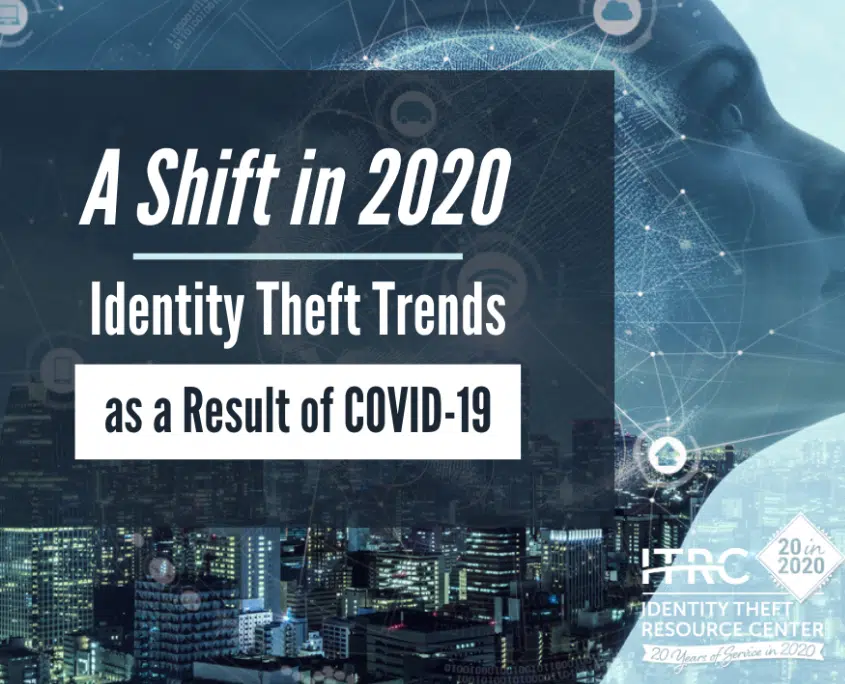A Shift in 2020 Identity Theft Trends as a Result of COVID-19
Home Help Center A Shift in 2020 Identity Theft Trends as a Result of COVID-19

Each year, the Identity Theft Resource Center (ITRC) reflects on the previous year’s exploits and anticipates trends for the next. When we first published our thoughts on 2020 back in December, it was stated that we anticipated the identity theft trends for 2020 would include 2020 being the year for privacy. While privacy remains an important topic, the recent changes in the landscape with other cyber issues have changed the conversation.
Data Breaches in Overdrive
Data breaches have continued to occur and the ITRC believes hackers and scammers will shift things into overdrive due to the amount of money that is about to flow through the economy, creating a redistribution of assets.
The coronavirus has forced most companies and their employees to work remotely. While that used to be a luxury, it is the new normal for many who previously haven’t had the experience. That has created a whole new challenge for companies, platforms, service providers and each individual employee.
In this post-COVID-19 shift, the ITRC anticipates breaches will continue to occur at an increased rate, both the number of breaches and the number of records exposed in a single incident. Given that there are a lot of new users that are creating an increase in user-data being housed in databases, it’s easy to see why this will be a potential outcome as a result of shifting workforces.
Increase in User Vulnerabilities Exposed
Security deficiencies are exposed daily, and more rapidly, because of the sheer volume of use of platforms. No one anticipated all of the vulnerabilities that would have to be fixed due to the increase in use. The ITRC has seen a massive shift in those priorities.
Now, issues that might have been well down the road to update need immediate attention because of how organizations have had to shift their use of products and services. Also, those providing those products and services must address the issues now to maintain the integrity of their users’ data.
There are other vulnerabilities with the new remote workforce that will be exploited as they become apparent over the course of the coming weeks and months.
Cybersecurity Issues Exacerbated by Remote Work
The previous 2020 identity theft trends that the ITRC predicted, in all likelihood, will happen. What is now new are the challenges that shifting to remote work as the primary method of working due to COVID-19 entail. All of the problems like ransomware, phishing attacks and patching are still going to be issues. However, they will be exacerbated by this shift in business being done by remote individuals. People who are not accustomed to working from home will be easy prey for hackers and scammers to exploit because of their lack of familiarity with platforms and processes.
Adding to that, companies that moved to stand up a remote workforce quickly may not have the proper policies, processes and employee training in place to guide their workers.
ITRC Is Here For You
Predictions like the 2020 identity theft trends are only educated guesses, based on previous events and information. Businesses, policymakers and the public will have to wait and see how the 2020 trends for identity theft, cybercrime and data privacy play out. Regardless of what happens the rest of 2020, the ITRC will be available, working to teach each person how to fight back against the techniques scammers will use to commit identity theft and support victims through the process of regaining their identities.
For a complete look at the ITRC’s 2019 Data Breach Report, click here.
Contact the Identity Theft Resource Center for toll-free, no-cost assistance at 888.400.5530. For on-the-go assistance, check out the free ID Theft Help App from ITRC.
You might also be interested in…
How much information are you putting out there? It’s probably too much. To help you stop sharing Too Much Information, sign up for the In the Loop.
Get ID Theft News
Stay informed with alerts, newsletters, and notifications from the Identity Theft Resource Center

